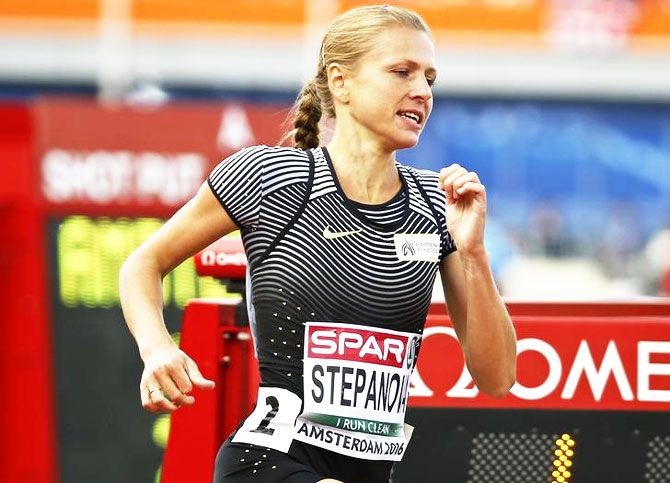
Russian whistleblower Yulia Stepanova may be in danger after her revelations on doping in her country that triggered a massive scandal and forced her to flee, but it is not the International Olympic Committee's responsibility, the IOC said on Saturday.
Middle-distance runner and former drugs cheat Stepanova helped uncover a state-backed and systematic doping programme that saw more than 100 Russian athletes banned from the Olympics, including essentially the entire track and field team.
She was then forced to go into hiding in the United States with husband Vitaly, a former Russian anti-doping official, after giving evidence that her government for years facilitated widespread cheating across nearly all Olympic sports.
The World Anti-Doping Agency (WADA) said last week her online doping management account, which includes her location and address, had been illegally accessed.
IOC president Thomas Bach, responding to a question about a perceived lack of support from the IOC for Stepanova, said: "I have to reject this. We are not responsible for dangers to which Ms. Stepanova may be exposed."
Stepanova said this week that the accessing of her account was done to discover her whereabouts. She has been branded a traitor by many people back home in Russia.
"If something happens to us then you should know that it is not an accident," Stepanova said in a conference call days ago.
NO CHANGE
She had been praised by the sport's governing International Association of Athletics Federations (IAAF) and cleared to compete in Rio but the IOC banned Stepanova due to her doping past and instead sent her an invitation to attend as a guest.
"The ethics commission had to answer the question whether it was appropriate to change the constitution of the IOC for Yulia Stepanova in order to be able to allow her to compete (in Rio)," Bach said. "It came to the conclusion this would not be appropriate.
"We invited her to come and we offered her support if she should need it. Not only support for her life but also for her future (sporting career)."
Stepanova's revelations, along with those of the former head of the Sochi 2014 winter Games drugs-testing laboratory, triggered a series of investigations including one from the WADA.
The so-called McLaren report issued last month described, among other things, how Russians were replacing positive doping samples with clean ones during the Sochi Games with the support of the Russian secret service.
Despite WADA's call for a blanket ban, Bach defended the IOC's decision to allow some Russians to compete after international federations cleared them saying it was a decision to protect clean athletes.
"We have taken a decision there in the interests of athletes, defending the individual rights of these athletes and not making athletes be responsible for irregularities of their government," Bach said.
He said all samples from Russian athletes at Sochi would be retested, adding that they would also be checked for any tampering, as described in the report.
"You can be sure all samples of all Russian athletes participating in Sochi will be analysed. They will also be analysed with regard to tampering," he said.








 © 2025
© 2025